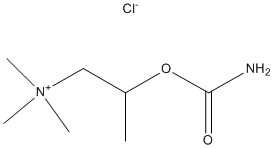All AbMole products are for research use only, cannot be used for human consumption.

Bethanechol chloride is a selective muscarinic receptor agonist without any effect on nicotinic receptors. Bethanechol chloride (0.3-300 μM) significantly reduces ileal pacemaker potentials. It is a parasympathomimetic choline ester. It is not hydrolyzed by cholinesterase and will therefore have a long duration of action. It does not involve the action of the muscarinic M3 receptor subtype in-vitro. Bethanechol (2-12 mg/kg; i.p.) induces drinking and increases urine output of rats in a dose-dependent fashion.
| Molecular Weight | 196.68 |
| Formula | C7H17N2O2.Cl |
| CAS Number | 590-63-6 |
| Solubility (25°C) | DMSO 10 mg/mL Water 40 mg/mL |
| Storage |
Powder -20°C 3 years ; 4°C 2 years In solvent -80°C 6 months ; -20°C 1 month |
[3] J L Schlatter, et al. Bethanechol chloride oral solutions: stability and use in infants
[4] J K Light, et al. Bethanechol chloride and the traumatic cord bladder
| Related AChR/AChE Products |
|---|
| Methoctramine tetrahydrochloride
Methoctramine tetrahydrochloride is a potent and cardioselectivity antagonist of M2 muscarinic receptor. |
| AT 1001
AT 1001 is a high-affinity and selective antagonist of the α3β4 nicotinic acetylcholine receptor (α3β4 nAChR) with Ki of 2.64 nM. |
| Dihydro-β-erythroidine hydrobromide
Dihydro-β-erythroidine hydrobromide is a potent, orally active, and competitive antagonist of neuronal nAChRs. Dihydro-β-erythroidine hydrobromide shows selectivity for α4β4 and α4β2 nAChRs, with IC50s of 0.19 and 0.37 μM, respectively. |
| Spinosad
Spinosad, a mixture of spinosyns A and D known as fermentation products of a soil actinomycete (Saccharopolyspora spinosa), is a biological neurotoxic insecticide with a broader action spectrum. Spinosad targets the nicotinic acetylcholine receptor (nAChRs) of the insect nervous system. |
| TAE-1
TAE-1 is a potent inhibitor of AChE and BuChE. |
All AbMole products are for research use only, cannot be used for human consumption or veterinary use. We do not provide products or services to individuals. Please comply with the intended use and do not use AbMole products for any other purpose.


Products are for research use only. Not for human use. We do not sell to patients.
© Copyright 2010-2024 AbMole BioScience. All Rights Reserved.
